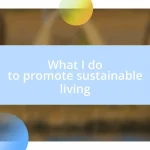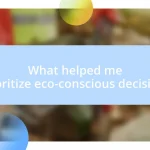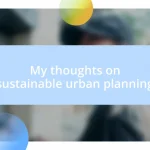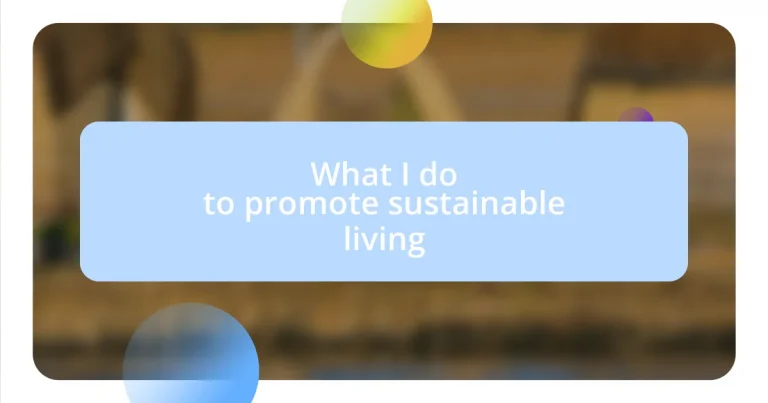Key takeaways:
- Embracing simple sustainable practices like composting and reducing single-use plastics can significantly reduce waste and empower personal responsibility.
- Sustainable living fosters community engagement and personal well-being, leading to financial savings and stronger connections with others.
- Encouraging sustainability in others through leading by example and sharing knowledge can create a collaborative spirit and inspire further change in the community.
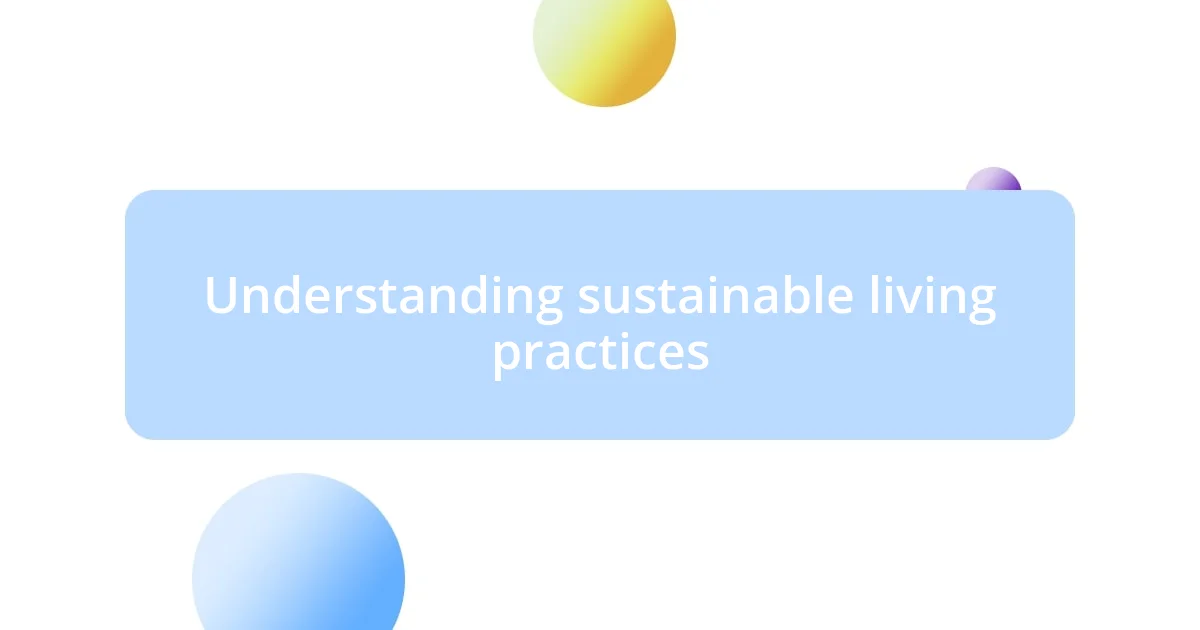
Understanding sustainable living practices
Sustainable living practices are all about making choices that support the health of our planet while also enhancing our quality of life. I remember the first time I decided to start composting in my small kitchen. At first, I was hesitant—wouldn’t it be messy? But once I saw how much waste I was preventing from going to the landfill, I felt a deep sense of accomplishment. Isn’t it amazing how simple actions can have such a profound impact?
Another practice I’ve embraced is reducing single-use plastics. I was once that person who would mindlessly grab a plastic water bottle at the store. However, after learning about the plastics issue and their long-lasting effect on our environment, I switched to a reusable bottle. It became my everyday companion. Each sip reminds me of the change I’m contributing to. Don’t you think it’s powerful to carry our commitment with us throughout the day?
Building a deeper understanding of sustainable practices also means being informed about our consumption habits. For instance, I started buying local produce after realizing how much energy was wasted transporting food across long distances. When I began visiting farmers’ markets, I not only supported local farmers, but I also enjoyed fresher, more flavorful fruits and veggies. How gratifying is it to know your purchase directly benefits your community?
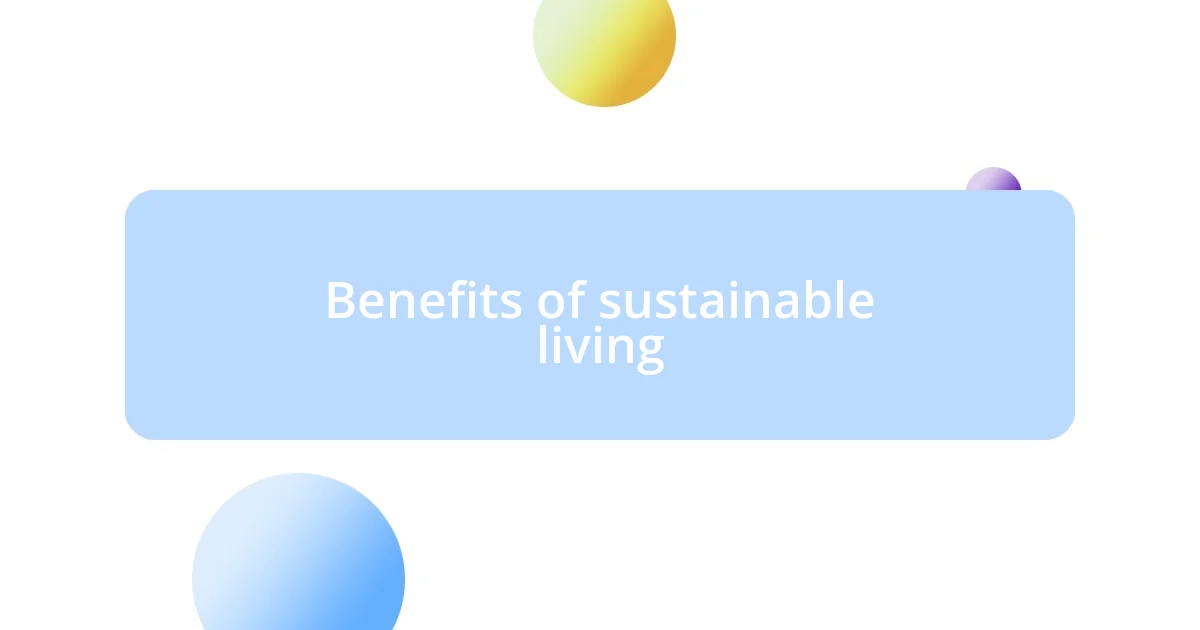
Benefits of sustainable living
The benefits of sustainable living are immense, impacting our health, environment, and wallets. When I made the switch to a more sustainable lifestyle, one of the first things I noticed was a significant reduction in my utility bills. By implementing energy-efficient appliances and opting for renewable energy sources, I not only saved money but also contributed to a cleaner environment. Think about it: who wouldn’t want to save more while also helping the planet?
Another profound benefit is the strengthened sense of community. For example, I recall attending local clean-up days with my neighbors. It was not just about picking up trash; it fostered a spirit of collaboration. Sharing stories and experiences with others who share similar values creates bonds that enrich our lives. Doesn’t it feel good to know you’re part of something bigger?
Moreover, sustainable living enhances personal well-being. I’ve personally experienced less stress since embracing minimalist practices. By decluttering and only keeping what I truly need, I found more mental clarity and calm. It’s fascinating how our surroundings reflect our inner state, isn’t it? Focusing on what truly matters can lead to a more fulfilling life!
| Benefit | Description |
|---|---|
| Financial Savings | Reduced utility bills through energy efficiency and sustainable choices. |
| Community Engagement | Strengthened ties with neighbors and local consumers by participating in sustainable initiatives. |
| Personal Well-being | Improved mental clarity and reduced stress through minimalism and mindful consumption. |
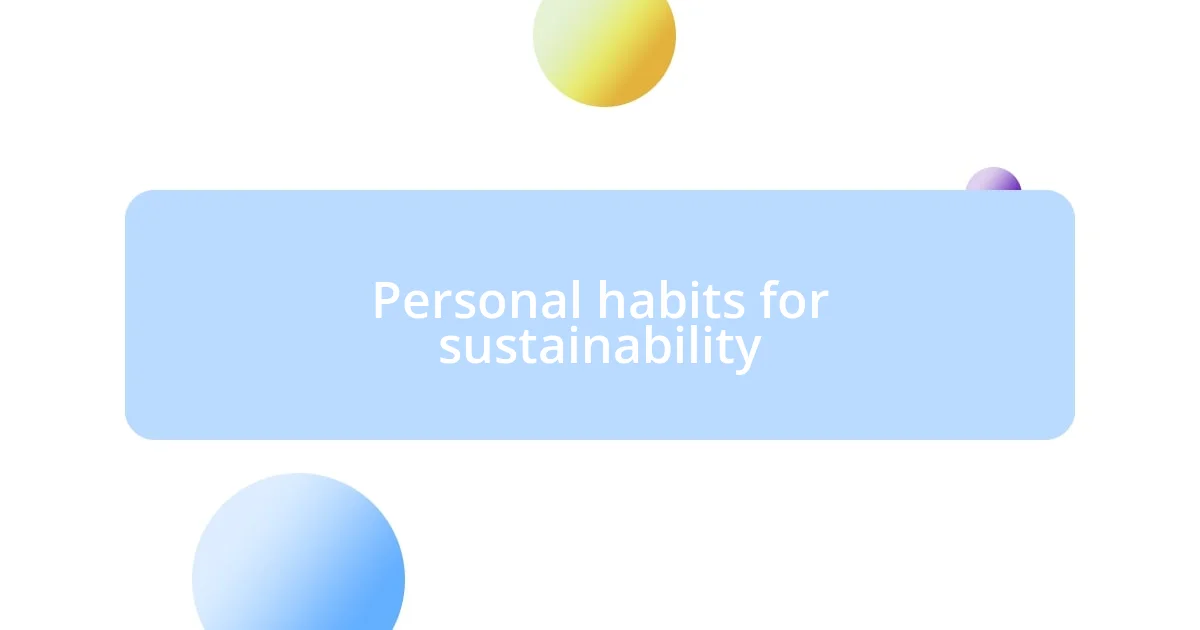
Personal habits for sustainability
When it comes to personal habits for sustainability, I’ve discovered that small changes can lead to significant impacts. One of my daily practices is using a fabric tote for my grocery shopping. The first time I forgot it at home, I felt an unexpected wave of disappointment, knowing I was contributing to plastic waste. Now, I keep a spare in my car, so I’m always prepared. It’s a little reminder that I can make a difference, one shopping trip at a time.
- Using cloth bags instead of plastic for groceries.
- Carrying a stainless steel water bottle to avoid single-use plastics.
- Composting kitchen scraps to reduce landfill waste.
- Choosing public transportation or biking when possible to minimize carbon footprint.
In addition to these habits, I cherish my ritual of meal planning each week. Initially, it seemed tedious, but I soon found that it saved me time and reduced food waste significantly. I’ve come to appreciate the mindfulness it brings to my meals. Preparing a menu allows me to focus on seasonal ingredients, connecting me to the cycle of nature. It’s inspiring to think about how my choices ripple through the environment.
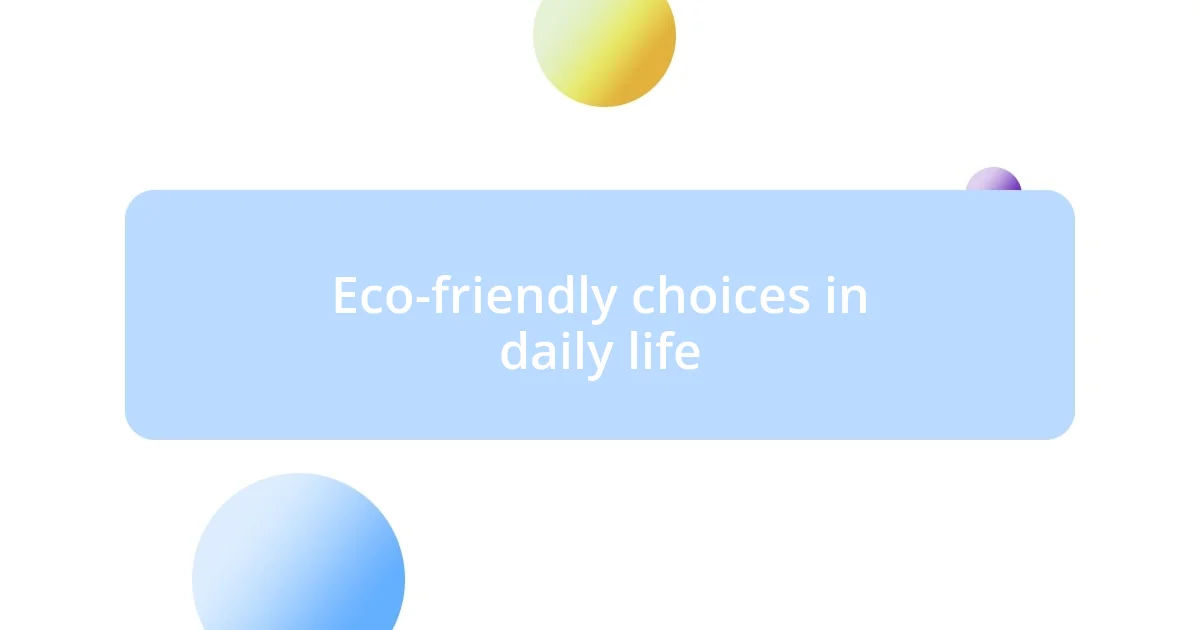
Eco-friendly choices in daily life
I often find joy in the little eco-friendly choices I make each day. Each morning, I brew my coffee with a reusable filter, a simple act that sparks pride in reducing waste. It’s not just about the coffee; it’s a daily commitment to sustainability that puts a smile on my face, reminding me that even the smallest decisions can have a meaningful impact. How often do we think about the habits we can change that lead to a healthier planet?
In my home, we’ve switched to natural cleaning products. Initially, I thought it would be challenging to ditch the convenient store-bought options. But I started experimenting with vinegar, baking soda, and essential oils. The transition was surprisingly refreshing! Knowing I’m cleaning without harmful chemicals makes me feel responsible and connected to my environment. Doesn’t it feel great when we embody the change we wish to see?
Reducing energy use is another priority for me. I’ve replaced conventional light bulbs with LED ones, and to be honest, I was initially skeptical about the difference. However, seeing my energy bill drop and knowing I’m using less energy is incredibly satisfying. Little adjustments to my lighting and setting timers around the house have made eco-conscious living feel attainable. Have you ever noticed how small shifts like these can actually transform your daily routine?
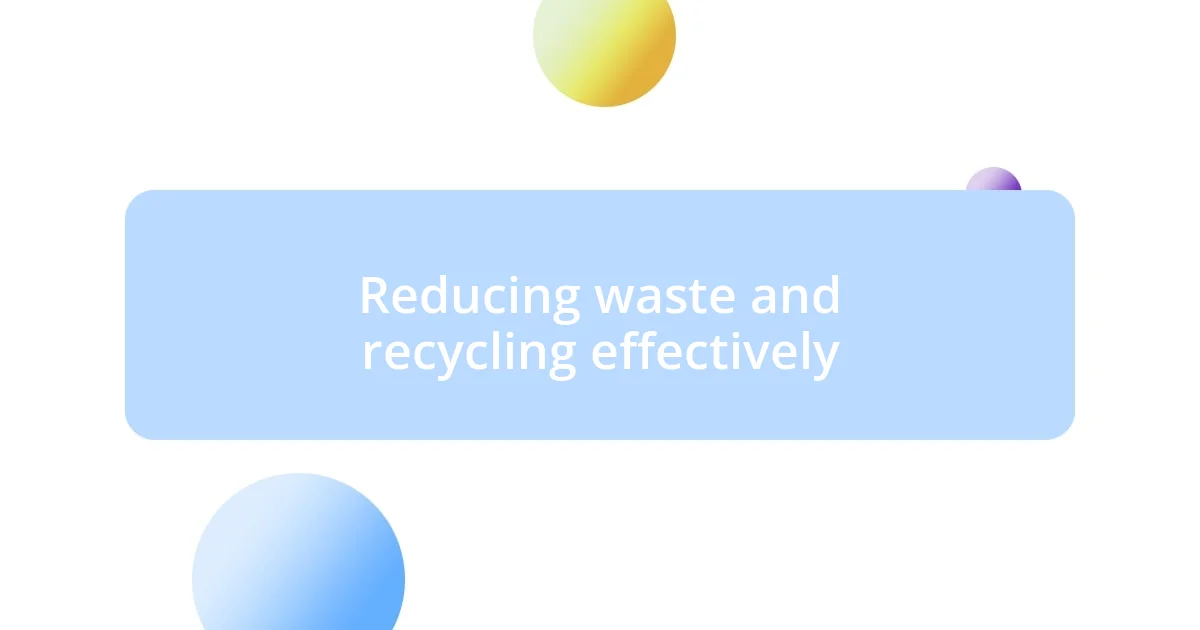
Reducing waste and recycling effectively
When I first started researching recycling, I was amazed by how poorly I was sorting my waste. I distinctly remember the day I realized not all plastics are recyclable, which felt like a wake-up call. I went through my trash, sorting items into their proper categories, and it struck me just how much effort it takes to recycle effectively. It’s a small investment of time, but gaining that knowledge has not only reduced my waste but also made me a more conscientious consumer.
One practice I adopted that positively impacts my recycling habits is my communal recycling group. We meet each month to share tips and even take turns transporting items to our local recycling center. Honestly, it’s become a little community of like-minded folks, and I can’t explain how encouraging it is to see others committed to the same cause. Have you ever participated in something similar? It fosters accountability and makes the process of reducing waste feel less daunting and more collaborative.
With digital technology at our fingertips, I’ve found online tools for tracking my waste and recycling habits invaluable. There’s an app I use that allows me to log what I throw away and what I recycle. Initially, I didn’t fully believe it would help me, but the insights it provides are eye-opening. I was shocked to see how quickly certain items accumulate! Each week, I find myself trying to reduce those numbers—it’s like a personal challenge that motivates me to think creatively about how I can reduce my waste even further. Have you tried tracking your waste? It can be surprising how much it changes your perspective!
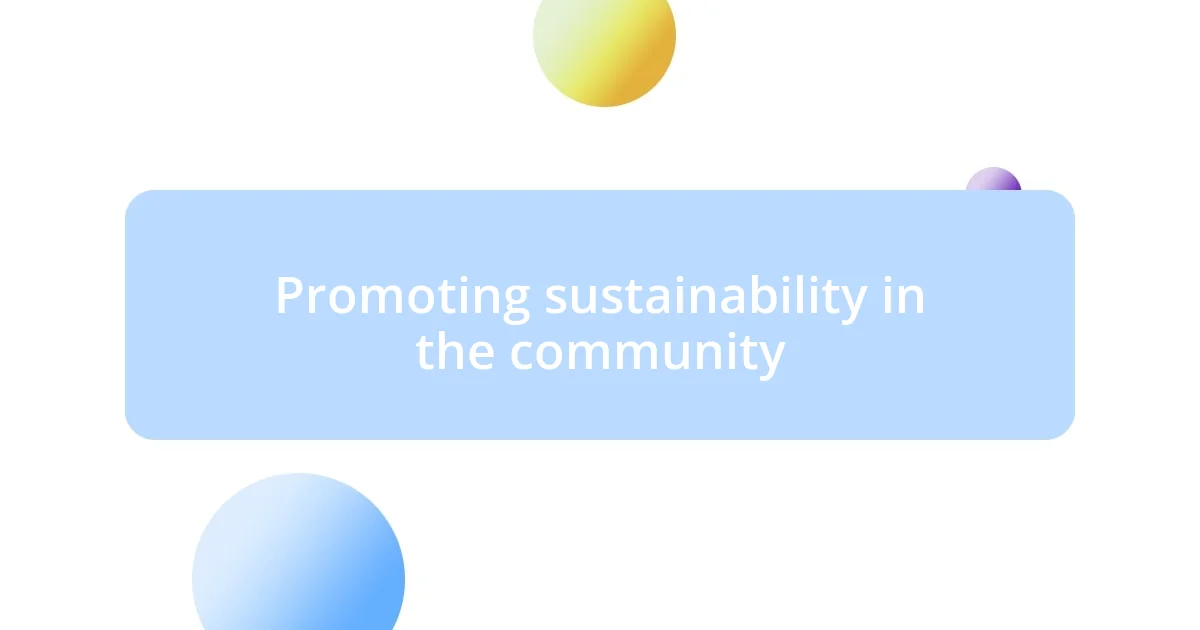
Promoting sustainability in the community
I’ve found that promoting sustainability in my community is both rewarding and impactful. For instance, I’ve organized neighborhood clean-up days, where we gather to clean local parks and public spaces. The camaraderie is infectious; there’s something special about seeing neighbors come together for a common cause. It leads me to wonder—what other ways can we engage our communities to take action for the planet?
One memorable experience was when I volunteered to lead a workshop on composting at our community center. Initially, I was nervous, fearing that others wouldn’t be interested. But to my surprise, the turnout was fantastic! Sharing the simple process of composting opened the eyes of many participants. It’s fulfilling to witness the spark of curiosity and commitment to reducing waste grow in others. Have you ever noticed how sharing knowledge can empower others to make changes in their lives?
I also actively participate in a local farmers’ market, where I connect with neighborhood farmers and promote seasonal eating. Each time I bring home fresh produce, I feel a sense of pride knowing I’m supporting sustainable practices. It’s not just about the food; it’s about building relationships and fostering a culture of sustainability within my community. Isn’t it amazing how local choices can create ripples of change in our lifestyle?
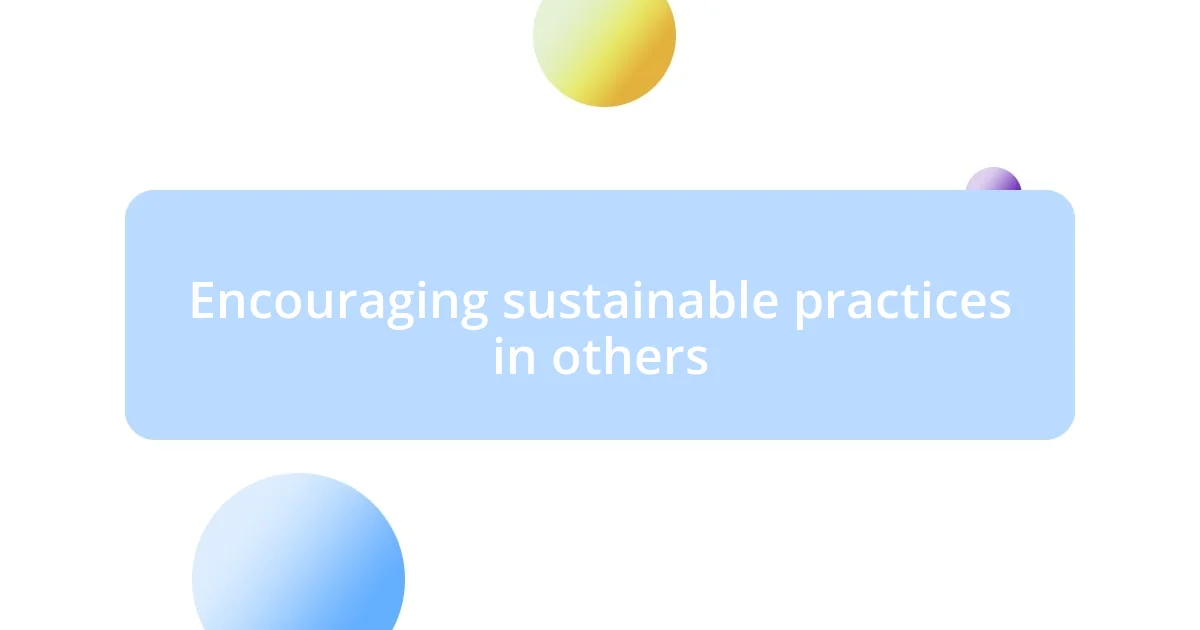
Encouraging sustainable practices in others
Encouraging sustainable practices in others often starts with leading by example. I remember when I switched to reusable bags for grocery shopping; it seemed like a small change at first. However, when friends saw me consistently taking those bags, they began asking where I got them and how they could make the switch too. Have you ever noticed how actions can influence others more powerfully than words?
Another impactful moment for me was when I hosted a potluck dinner focusing on sustainable recipes. Each guest brought a dish made from local ingredients, and the conversation flowed naturally around sustainability. It was enlightening to hear everyone’s experiences and challenges regarding food waste. By sharing our collective knowledge, we sparked a lively discussion that motivated some to experiment with sustainable cooking at home. Isn’t it gratifying to create a space where ideas about sustainability can thrive?
Lastly, I believe the potential of social media shouldn’t be underestimated. I started posting about my zero-waste journey on my personal profile, sharing both successes and failures. It shocked me to see how many people messaged me, eager to learn more and share their own stories. This interaction sparked a small online community dedicated to sustainable living, reminding me just how effective our personal stories can be in inspiring change. Have you considered using your social platforms to connect with others interested in sustainability? It can be a transformative experience!







